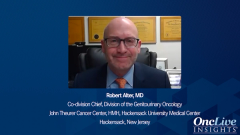
Adverse Events with IO-TKI Combination Treatment Regimens
Two oncologists describe common adverse events seen with I/O–TKI combination treatment regimens for advanced renal cell carcinoma and when they choose to stop the therapy.
Episodes in this series

Eric Jonasch, MD: In terms of your practice, what are the most common adverse events with I/O [immuno-oncology]–TKI [tyrosine kinase inhibitor] regimens in the community that you’re seeing? What’s your strategy is in dealing with those?
Sumeet Bhatia, MD: The major adverse effects we see are hypertension and fatigue. We take care of that with calcium channel blockers and, in some people, ACE inhibitors. Fatigue is a very difficult adverse effect to work on with patients, and that’s a very common cause for dose reductions. I would mirror your experience in that when we use axitinib, it’s very difficult to a higher dose than the 5 mg on the package insert. It’s almost undoable. When we have dealt with cabozantinib in my practice, I’ve struggled to start patients on the full dose as recommended. We’ve universally started at a smaller dose with cabozantinib and worked our way up when necessary. All their fatigue becomes a major issue.
If this patient, had hematuria, how would you have proceeded with the choice of your TKI?
Eric Jonasch, MD: The interesting paradox of hematuria is that TKI–I/O combinations are often quite effective at stopping hematuria. But it raises a question: if you have a patient who comes in and has very small-volume metastatic disease and then has a very large primary tumor mass, this might be the type of patient for whom you’d want to do a nephrectomy up front and move on to managing the metastatic disease. But if I have a patient who comes in and has hematuria and a very worrisome burden of metastatic disease, they frequently end up getting a resolution of that. It’s counterintuitive because you think a TKI might enhance the bleeding. But it generally doesn’t do that.
Sumeet Bhatia, MD: Have you changed your dose of pembrolizumab to every 6 weeks as a companion when you use lenvatinib? Especially in the days of COVID-19, we started doing this. Have you incorporated that practice while you’ve combined them with lenvatinib?
Eric Jonasch, MD: In some patients, we certainly have been doing that. In others [we have] not. It ends up being a question. Using the every-3-week dosing is sometimes a way of touching base with the patient that makes sure we’re staying on top of them from an overall toxicity and well-being perspective. But there are others for whom, from a practicality perspective, we do switch them to every 6 weeks.
Sumeet Bhatia, MD: As we were discussing this regimen, we focused a lot on the toxicity of TKI inhibitors. But what about pembrolizumab? Your patient didn’t double up a low cortisol state and needed replacement. What has been your experience with that in this situation?
Eric Jonasch, MD: We certainly do see I/O toxicities. It’s much less common than with ipilimumab-nivolumab, but we’re seeing the –itises. We’re seeing hypophysitis, we’re seeing colitis, we’re seeing nephritis, and we’re also seeing hepatitis, with the elevation of liver enzymes. We’re managing those, and it’s easier than with ipilimumab-nivolumab across all these I/O–TKI regimens and it’s not super problematic.
Sumeet Bhatia, MD: In your clinical practice, when you see these patients as their creatine starts creeping up, how do you manage that? How do you go about your diagnostic work-up and management considering the possibility that it could be from renal dysfunction, hypertension vs nephritis? What’s your diagnostic work-up, and how do you deal with that?
Eric Jonasch, MD: It’s an interesting challenge. We definitely look at urinary eosinophils. If we’re seeing a significant bump up, the differential diagnosis is TKI-related renal dysfunction, which happens. Oftentimes you’d see that together potentially with proteinuria, but if you’re seeing that the urinary eosinophils are going up, we refer them to nephrology. Sometimes you need to do a biopsy to look at this and better understand it. Fortunately, it’s not happening often, but in those individuals for whom it does happen, more often than not it’s probably I/O related.
Sumeet Bhatia, MD: That boils down to quality of life. Can I ask you to comment or review the subgroup analysis of the CLEAR study of lenvatinib-pembrolizumab in terms of quality-of-life outcomes?
Eric Jonasch, MD: This was interesting. QoL [quality of life] or patient-reported-outcome data are definitely things we’re learning to understand. We’ve had QoL data for ipilimumab-nivolumab. We’ve seen it for axitinib-pembrolizumab and for cabozantinib-nivolumab. In the CLEAR study presented by Bob Motzer in 2021, they used a number of measures, including the fixieand several other tools that compare the quality of life of the people on pembrolizumab-lenvatinib vs sunitinib. The main take-home from this presentation was that the time to deterioration of these metrics was better or longer in the pembrolizumab-lenvatinib arm compared with the sunitinib arm. This demonstrates that quality of life started deteriorating sooner in the sunitinib group. That interpretation is because disease control was much better in the lenvatinib-pembrolizumab arm; that’s why we’re seeing this. We’re still some ways from taking these tools and translating them into what this means for our patients. That’s a key thing we have to get better at.
Transcript edited for clarity.








































